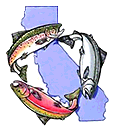Please email info@calsalmon.org if you have any questions or suggestions for other resources to be listed here.
Upcoming Trainings:
Certified Beaver Coexistence Professional Training: There are a few fully-subsidized spots left for individuals to apply to become a Certified Beaver Coexistence Professional through our partnership with the Beaver Institute and their BeaverCorps online training program. Tuition costs are waived through a partnership between the WATER Institute at Occidental Arts & Ecology Center, the Beaver Institute, and the California Department of Fish and Wildlife. Tribal applicants are especially welcome. Learn more here.
CST Chemical Safety Training for Tribes: please email ChemSafetyTraining@gmail.com for more information.
Upcoming Events:
Please email info@calsalmon.org if you would like to share upcoming programs.
Upcoming Opportunities:
Hoopa Tribal Education Seeking Cultural Practitioners (added 11/24/2025): If you are interested in future contract opportunities to support the Hoopa Tribal community by leading cultural demonstrations, hosting workshops, sharing stories, or giving educational presentations, please fill out their Cultural Practitioner Interest Form. Your knowledge, skills, and teachings play an important role in strengthening community and preserving cultural practices. For questions or more information, please contact: Onaleece Colegrove, Education Director, hoopa.ed.director@gmail.com, 530-625-4413.
Funding:
TBA
Websites:
Tribal Fisheries Resilience Project (Cal Poly Humboldt)
Videos & Recorded Trainings:
10/9/2025: A press conference was hosted on October 9, 2025 marking the first anniversary since the removal of the four lower Klamath dams. Scientists, advocates and Tribes are celebrating the dramatic ecological improvements already seen in and near the Klamath River. Ongoing scientific monitoring, which started years prior to dam removal, has enabled the documentation of significant advances in water quality, water temperatures, and the rapid return of native salmon populations to previously blocked habitats. Video Recording Available Here.
11/6/2024: Leaf Hillman, Karuk tribal member and Co-Chair of the Tribal Northern Region Leadership Council of NCRP; and Cleo Woelfle-Hazard, Fire Advisor UC Cooperative Extension, share insights on how prescribed and cultural fire can increase streamflow, and how future changes in snowpack and rainfall will affect conditions for salmonids and other aquatic species in the Klamath Basin. Video Recording Available Here.
